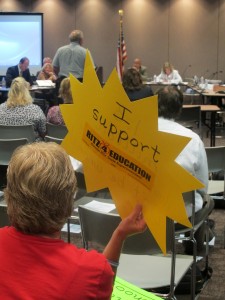Tension Interferes With State Board Agenda, Makes Teachers Anxious
Infighting is nothing new for Indiana’s State Board of Education.

Rachel Morello/StateImpact Indiana
A crowd member shows her support for State Superintendent Glenda Ritz during July's State Board of Education meeting.
In the last year alone, board meetings have resulted in a walkout, a lawsuit and a whole lot of confusion.
But tensions between the board and its chair, superintendent Glenda Ritz, reached a new level at last week’s meeting.
As we reported, board members brought forth two controversial resolutions. One would allow them more involvement in important matters, such as the state’s No Child Left Behind waiver, and another would change meeting procedures to give everyone a say in planning and appeals.
This latest power struggle arguably interferes with the work the state’s education leaders are supposed to be doing, and many constituents – notably teachers – have expressed concern.
- 'I Just Want To Teach!'Infighting is nothing new for Indiana’s State Board of Education. But tensions between the board and its chair, superintendent Glenda Ritz, reached a new level at last week’s meeting. Ritz says the board is trying to undermine her authority and board members for their part are questioning what authority Ritz really has. StateImpact Indiana’s Rachel Morello describes this latest power struggle and how it’s interfering with the work the state’s education leaders are supposed to be doing.Download
Why All the Tension?
Ritz, a Democrat, chairs a board comprised completely of members appointed by either current Governor Mike Pence or his predecessor Mitch Daniels, both Republicans.
Politics seems to play a large role in the latest friction, much of it stemming from questions about power: who has it, how much, and under what circumstances.
Ritz said the board is trying to undermine her authority with their resolutions, which she called “insulting.” Some of her supporters who showed up to the meeting argued that as an elected official, she deserves respect.
“While obviously this board shares an educational philosophy, there are many of us in the state in that 1.3 million that voted for Superintendent Ritz who do not necessarily share your educational philosophy,” said Jeff McDaniel, Vice President of Legislation for the AFT Indiana union.
For their part, board members deny any attempt to strip Ritz of her power as chairwoman. They say they simply want to be able to ensure they can give input on policies.
“It’s never personal, and it’s never political,” member Dan Elsener said during the meeting, drawing groans from Ritz supporters in the audience.
“None of us serve here for that reason,” Elsener continued. “We are here to do the work of education.”
But members maintain that just because Ritz is the board chair, doesn’t mean she has the final say.
“The voters elected Superintendent Ritz to be the Superintendent of Public Instruction, which is very different from being the head of education in the state of Indiana,” said board member Gordon Hendry. “The governor, the legislature, and the State Board of Education have a very critical role to play in education policy in the state of Indiana. There’s no such thing as an ‘education czar’ in the state.”
This type of bickering has become a mainstay at State Board meetings since not long after Ritz was sworn in as superintendent. The board has clashed on issues such as A-F school letter grades and statewide academic standards in recent months. Board members have also accused Ritz of not putting their items on the agenda for discussion
Oversight of the Board’s operations and budget used to fall to the Indiana Department of Education. But in 2013, state lawmakers decided to fund the Board as a separate line item, leading to concern that the board would not continue to work with the superintendent’s office.
Last August, Governor Mike Pence created a new state education agency, the Center for Education and Career Innovation (CECI), to coordinate efforts between the State Board and other panels exploring career and technical education. Ritz says she is used to the governor and CECI interfering with her work, particularly on the recent submission of the state’s No Child Left Behind waiver.
“I am used to critiquing by CECI on a daily basis,” Ritz said. “Politics and discrediting me and the department is more important to them than extending this waiver to Indiana’s children, potentially causing harm to service being provided to the students in our schools.”
Politics Versus Policy
Kindergarten teacher Twyla Flint says although it can be interesting to see the interplay between board members, she really just wishes they could get to work.
“Personally, I just want to teach my children!” Flint exclaims. “That’s one of the main things all of the bickering, that takes away from just us wanting to educate the children.
Many educators are concerned that all this fighting is getting in the way of policy items that need to be addressed.
Seria Walton, a middle school math teacher in at Andrew Academy in Indianapolis, is concerned she and her staff don’t know exactly what direction to go on the new state academic standards Indiana created in April.
The Department of Education just released curriculum guides for those standards last month. That only allows teachers a few more weeks before school starts in August to make sure they’re on track before students come back.
Walton says she’s been trying to understand what the new standards actually mean and create pertinent lesson plans. She reiterates what we’ve heard other teachers say since Indiana dropped the Common Core back in April: she’s a bit worried.
“The assessment part is a little concerning right now for our students because we don’t know exactly what direction it’s going to go into,” Walton says. “As we’re trying to prepare for this year and provide professional development for the teachers in order to support students and learning, we don’t know what’s actually going to be assessed, what system we’re actually going to use.”
Walton says clarity and direction from the State Board is much needed.
“The focus is not where it needs to be,” Walton says. “We need to make sure that we are putting some of our personal feelings to the side because the board is making decisions based upon an entire state that affects thousands and thousands of children.”
Walton’s colleague Sheila Akinleye, a high school teacher with IPS, agrees.
“As a teacher, parents, students and community members look to me for answers as to what’s going on,” Akinleye explains. “If I’m not sure, or if it’s ambiguous in some way, it makes it really tough.”
“It’s embarrassing.”
Teachers aren’t alone in their frustrations.
Board member Sarah O’Brien says it’s a shame politics has become the focus of not only board meetings, but public discussion as well.
“There was a whole lot of important information that was on our agenda today, and none of that got any play,” O’Brien said. “It’s embarrassing, because it takes the attention away from the students.”
O’Brien, also a teacher at Avon Schools, says it’s time for her colleagues to get back to business.
“It is my hope that while there might be conflicting personalities, that we can all find a way to work through that and actually get those things done that need to be in place to improve education across the state.”
As far as the actual rulings that came out of Wednesday’s meeting, the resolution passed to involve the board more in future decisions around the state’s No Child Left Behind waiver. Details on exactly how the board will be involved aren’t clear.
The board also moved to create a subcommittee which will take a closer look at board rules and procedures. Superintendent Ritz will appoint the members of that committee prior to the board’s next meeting in August.
